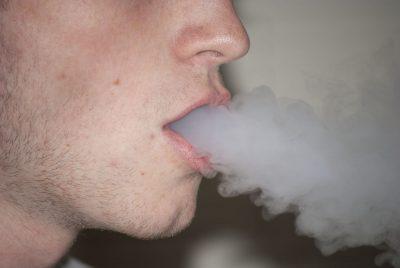
A state judge ruled Monday that Massachusetts Gov. Charlie Baker’s ban on the sale of all vaping products will be allowed to remain in place. However, the ruling also criticized Baker’s handling of the situation and outlined further steps the governor must take to preserve the ban.
Suffolk Superior Court Judge Douglas Wilkins ordered Baker to resubmit his Sept. 24 ban as an emergency regulation by Monday or be forced to allow nicotine vape sales to resume. Under state law, emergency regulations are limited to three months, meaning this ban would terminate on Dec. 24 if no further action is taken to extend it.
But while the decision leaves an opening for nicotine vaping products if Baker does not take action, it contained no such opportunity for THC vaping products, as CDC investigations have linked THC to recent spikes in vaping-related lung injury and death.
If Baker complies with the ruling and reissues his ban, he will have to release a small business impact statement and allow public comment, according to the court document. The verdict stated granting Baker time to address concerns posed by affected groups would help prevent confusion.
Both Baker and Vapor Technology Association, the industry group that filed the lawsuit, appealed the ruling Wednesday.
Michael Siegel, a professor at Boston University’s School of Public Health, testified to Congress last week against a ban on e-cigarettes. The physician and public health researcher said in an interview that Baker’s ban misses the mark on reducing vape-borne illnesses — in fact, it could make things worse.
Products from the commercial vape industry are not what’s causing these diseases, Siegel said. Instead, it’s black-market THC e-liquids that pose the real risks, because these are not FDA-regulated and are prone to counterfeit branding or mislabeling.
The medical community has not confirmed what is in the counterfeit vapes, Siegel said, but a growing number of researchers are pointing toward one substance as a possible culprit.
“In the overwhelming majority of the THC cartridges that have been recovered from affected patients, they have found high levels of vitamin E acetate oil — a thickening agent that has recently become popular in the black market that’s used to thicken the liquid to make it look like it has more THC in it,” Siegel said.
While there is no definite proof that these cartridges were responsible for the rise in vaping related lung illnesses, Siegel said the timing was uncanny.
“Its use picked up rapidly in 2019,” Siegel said. “And so the timing of this is quite a coincidence, that we’re starting to see a large number of these cases right after this thickening agent started to appear.”
Siegel said he believes blocking residents from legally purchasing vaping products will not stop users from vaping, but instead push young users toward black market sellers mixing their own liquids at home.
“The lesson that we should have learned from [alcohol] prohibition is that when you have a really, really popular product, if you ban it, it doesn’t solve the problem,” Siegel said. “All it does is put the product underground.”
Meanwhile, local smoke shops continue to feel the ban’s impact. Pete Patel, owner of Liquid Smoke and Vape Shop in Allston, said 70 to 80 percent of his revenue comes from vape sales.
“One day’s sales used to be like $1,500 to $1,600 a day and now it’s more like $400 or $300 a day,” he said. “We might have to shut down. That’s the only option.”
Patel said he has a five-year lease on his store and closure would cost him penalties. He said he might attempt selling his leftover vape stock to stores in other states, but would have to set the price at half of the products’ wholesale price.
“So still, I’m losing money, but I have to at least get something,” Patel said. “We have to pay all expenses, but it’s totally, totally just disaster. It’s nothing good for us.”
The Consumer Advocates for Smoke Free Alternatives Association, a non-profit advocacy group for tobacco substitutes such as vape products, conducted a survey (before the Massachusetts moratorium) asking how people would react to a vaping ban.
More than 90 percent of respondents said they would pursue black or gray market products, CEO of the CASAA Alex Clark said in an interview.
Some individuals who use vape as an aid to avoid smoking cigarettes might also find themselves pulling out their old lighter, Clark said. A recent, informal CASAA poll found that 20 percent of participants responded saying they would go back to cigarettes.
“We know it’s already happening,” Clark said. “As far as I know, there isn’t anything sort of official in terms of surveys or polling. But we’re very concerned that a significant number of people will just return to smoking.”
Real estate consultant John Gambone, 34, of Kenmore described his past self as a “heavy cigarette smoker.” After trying multiple products to no avail, he successfully quit smoking after testing out JUUL, whose vapes carry high concentrations of nicotine salts.
After the initial ban went into effect Sept. 24, Gambone said he returned to cigarettes at first before choosing to cross state borders to obtain more vape from New Hampshire and Connecticut.
“I go to Foxwoods once a week and I pick up the vapes when I’m down there,” Gambone said. “[I’ll continue] until I find an adequate replacement for vaping, whether I quit entirely or switch to another smokeless product. I had to start using a smokeless tobacco product called Velo, which is like a mouth lozenge.”
Audrey Sun, 22, of East Boston, said she was underage when she began vaping. Because she could not purchase products in the city, Sun ordered liquids weekly from an online dispenser before a combination of cumulative costs and delivery time incentivized her to quit.
“For the ban, in general, I think it’s doing more harm than it is good,” Sun said, “because if people who are legal to buy it can’t buy it, they’re going to find another way to get it.”


